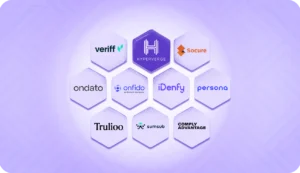With thousands of fintech companies operating worldwide, the pressure to streamline onboarding processes while maintaining robust KYC practices is more significant than ever.
KYC serves as a critical framework for fintech companies to verify customer identities and assess risks. It ensures that they comply with legal requirements and protects businesses from crimes such as financial fraud and money laundering.
Moreover, failure to comply can lead to severe penalties. According to GOV.UK, in 2021, a UK firm faced a £23 million fine for inadequate customer due diligence.
As fintech continues to disrupt traditional banking, integrating advanced technologies such as artificial intelligence into KYC processes is becoming essential.
In this blog, we will explore the critical role of KYC in fintech, delve into the latest trends and best practices, and discuss how companies can effectively implement KYC measures to safeguard their operations and build trust with their customers.
Significance of KYC in the fintech industry
Know Your Customer (KYC) is a set of procedures used in the investment and financial services industry to verify customers and assess their potential risks and financial profiles.
KYC is an umbrella term consisting of three components:
Every country and region has its own KYC guidelines. The regulatory bodies’ efforts have been consistent with centralizing customer verification standards, but there are none to follow yet.
In the US, KYC follows the pre-ordained rules and regulations of Anti-money Laundering (AML) laws, such as the Bank Secrecy Act. Some industries that utilize KYC include gaming, fintech, banking, logistics, e-commerce, crypto, and credit unions.
5 Key benefits of KYC automation in the fintech industry
KYC automation utilizes software to examine and validate identity documents like passports, driver’s licenses, and utility bills. With the help of advanced data analytics and machine learning algorithms, it can also quickly consider a specific client’s risks or red flags.
KYC procedures are now made more efficient with KYC automation. Let us take a look at the 5 notable benefits of process automation in KYC, given below:
1. Enhance customer experience through seamless onboarding
A seamless onboarding journey simplifies the KYC procedures and builds trust and confidence among users. With advanced technologies like AI and machine learning, fintech companies can streamline data collection, automate verification processes, and minimize manual intervention.
Reducing friction helps the process work seamlessly while curtailing abandonment rates and increasing user satisfaction. Since KYC procedures take too long to execute, users find it challenging to stay until the end, which is when they abandon the procedure. Hence, automation is the key to replacing this exhausting process.
2. Achieve significant cost savings by reducing operational expenses
Financial institutions and organizations benefit greatly from KYC automation, which results in cost savings. Reducing manual labor, paperwork, and infrastructure makes operations more budget-friendly.
With KYC procedures streamlined through automation and advanced technology, fintech companies can significantly reduce the costs associated with manual data collection and verification. Implementing AI-driven solutions helps to minimize human error, accelerate customer onboarding, and enhance data accuracy, leading to lower operational overheads.
3. Streamline operations via third-party integrations
Fintech companies can significantly streamline their KYC processes and reduce operational costs by integrating third-party identity verification providers. These KYC integrations, typically done via APIs, automate identity checks and ensure compliance with anti-money laundering regulations.
For example, a fintech lending platform can integrate with a third-party KYC provider to verify loan applicants’ identities throughout origination.
By offloading identity verification to specialized providers, fintech firms can focus on their core business while meeting KYC requirements efficiently. These third-party KYC integrations enable fintech companies to scale their operations cost-effectively as they acquire more customers.
4. Highly scalable and maneuvering workload conveniently
KYC automation can handle large amounts of data conveniently without compromising its performance. This scalability allows fintech businesses to increase and experience seasonal spikes, especially during periods like the end of the financial year, tax season, and holiday shopping periods. Automated KYC can enhance workload and adjust accordingly to keep the KYC process efficient.
5. Improve regulatory compliance management
KYC compliance follows relevant regulatory needs automatically. This way, businesses can avoid penalties and non-compliance issues, such as inadequate record-keeping and data privacy violations.
KYC is a part of AML that helps integrate national and international regulatory databases.
5 KYC programs for fintech businesses
Businesses across BFSI (banking, financial services, and insurance) must understand the elements required to mandate KYC compliance. When businesses engage in digital identity verification, they rely on specific documents and factors to confirm their authenticity.
Let us take a look at the 3 essential elements of KYC compliance for fintech business:
1. Customer Identification Program (CIP)
CIP helps businesses identify customer’s credibility, ensuring they are who they say they are. The Patriot Act of 2001 states that all account holders must verify their documents for CIP.
| Some key points to remember concerning CIP are: Customer screening is one of the more important criteria for the fintech industry which is why they implement CIP.FinCEN (Financial Crimes Enforcement Network) is the primary regulatory body in the US that is responsible for safeguarding the country’s financial system from money laundering fraud. In 2022, FinCEN acquired $7.7 bn in asset seizures, which defines the critical role of robust regulatory measures, including CIP, in combating financial crimes. |
Banks must carefully analyze the CIP’s reliability, accuracy, and applicability before declaring it legitimate.
2. Customer Due Diligence (CDD)
Identifying customer identities is a must for fintech companies to establish their credibility. CDD is integral to the KYC procedure. It checks the integrity of the customer through documents available in any database. Fintech businesses must conduct CDD before onboarding users to initiate transactions effectively.
| There are two types of CDD:Enhanced Due Diligence (EDD)—Companies use Enhanced Due Diligence (EDD) for customers identified as high-risk. This includes individuals or entities at greater risk of illicit financial activities. EDD involves more thorough checks and ongoing monitoring to address these heightened risks. Simplified Due Diligence (SDD)—Companies use Simplified Due Diligence (SDD) for customers with a lower risk of money laundering. This process involves less rigorous checks compared to Enhanced Due Diligence (EDD) and focuses on customers deemed to have a lower risk profile. |
3. Enhanced Due Diligence (EDD)
EDD helps gather and verify information about a client or a customer. Like CDD, it is utilized for enhanced scrutiny of businesses and focuses on the risks of financial crimes that general CDD processes cannot detect.
EDD deals with high-risk clients and is suitable in situations such as:
- Politically exposed persons (PEPs)
- Clients subject to economic sanctions or based in sanctioned nations
- Businesses handling large and complex transactions
- Businesses in high-risk countries
- Transactions involving multiple parties or jurisdictions
| EDD consists of collecting information such as: Gathering customer information (name, date of birth, address)Identifying the customer’s beneficial owner Understanding the goal and nature of the business relationship and more |
4. Ongoing monitoring
Since a single view of customer details is insufficient, the BFSI industry scans customers frequently. Fintech firms must continuously monitor clients based on their activities and associated risks, such as unusual transactions. Continuous ongoing monitoring is an integral part of the KYC process since any sudden spike in the customer’s buying behavior can indicate signs of fraud.
Fintech businesses can record these frequent scans and report any suspicious activities in clients’ buying behavior to the appropriate authorities.
| The monitoring system checks the following factors when screening a customer: Elevated business activity Any anonymous deals Regular international transactions |
5. Documents required for KYC verification
KYC is significant for money transactions in fintech businesses as it validates a customer’s legitimacy and determines whether they come from a credible organization or source. This feature helps prevent money laundering in terrorist financing and other shady financial crimes.
| The most important details that businesses request from a client include: Social security cardPassportDriving license Credit or debit card Housing contracts and rental agreementsUtility bills Bank account statements or passbook entriesProof of Residence issued by a notary public or government authority Maintenance bills |
Your organization must also follow Know Your Business (KYB) practices so that the customers and other businesses can trust your credibility. Ensure you update your business identification number, incorporation details, and Ultimate Beneficial owners (UBO) to be a credible source for business.
Top 4 KYC challenges in the fintech industry
KYC regulations are mandatory for fintech businesses. However, they are complex to deal with. They generally require extensive registration and form-filling sessions to secure the company from fraudsters. Although, in doing so, they provide an exhausting user experience.
Hence, to reduce friction, it is essential to tread the fine line between stringent KYC measures and a seamless user experience. Some of the 5 challenges regarding fintech KYC include:
1. Data security issues
Managing large volumes of data can raise a few security concerns about data privacy. Hence, fintech companies must comply with data protection regulations like GDPR while organizing customer due diligence.
| Solution: Complying with data protection regulations is the best way to manage data security measures. This helps with KYC compliance and eliminates any overlying threats to your database. |
2. Global regulatory compliance
Differing KYC guidelines constantly updated in each country, resulting in varying regulatory compliance. Fintech industries operating in multiple regions may struggle to navigate the updated compliance rules from different areas.
| Solution: The most effective countermeasure to these issues is developing a centralized body to oversee all global KYC standards. By choosing the right KYC solution provider, fintech firms can focus on their core business activities while ensuring robust compliance with regulatory requirements worldwide. |
3. AI-based challenges
Technological evolution brings both advantages and disadvantages to fintech industries. AI not only positively refurbishes internal compliance workflows but also introduces new risks.
Cybercriminals utilize many techniques to bypass traditional identification verification methods. For instance, they use deepfakes or forged documents to breach age verification systems. Deepfakes pose a significant concern, making KYC mandatory for organizations worldwide.
| Solution: Liveness detection can stop deepfakes from breaching your system. It ensures that the biometrics made are from a living person and not forged. It restricts static videos or images and prompts the user to execute an action to prove they are alive by requesting them to upload a selfie. The organization then uses this image to tally with the user’s ID to confirm their identity. |
4. Poor user experience
Complicated and extensive onboarding processes make the process exhausting for its users, while straightforward procedures can cause compliance issues. Maintaining due diligence and an easygoing user experience are significant in a KYC process.
| Solution: To stay KYC compliant, a proper balance must exist between required risk assessments and a navigable user interface. This facilitates onboarding more clients, reduces dropoff rates, and provides an affable user experience. |
HyperVerge provides an effortless, extremely navigable user experience and the necessary risk assessments to allow companies to stay KYC compliant.
Top 4 best KYC practices to follow for fintech business
Below are the best practices with which you can adopt a successful fintech compliance framework for your business:
1. Build a culture of compliance with employee training
Fintech companies need to establish a healthy working culture of compliance, offering employees active training on regulatory requirements and how to incorporate them during KYC practices. This may include risk assessment, AML regulations, and CDD procedures. This increases the risks of non-compliance and combatting financial crime.
2. Implement continuous monitoring and data updates
Tracking and staying up-to-date with customers’ KYC information is something that Fintech companies must practice. Such a practice includes tracking customer transactions and assessing risk changes that might need additional monitoring or verification.
Companies must also implement processes to update data, such as requiring additional verification procedures and requesting updated identity documents.
3. Streamline customer onboarding for efficiency
Fintech companies must streamline their customer onboarding process to enhance KYC efficiency. This includes leveraging digital solutions, such as mobile apps, to facilitate the verification process.
Effective streamlining of the onboarding process improves the customer experience and reduces the risk of non-compliance due to manual errors.
4. Adopt effective fraud detection measures
Implement robust KYC fraud detection measures to prevent and address financial crime. This involves using machine learning algorithms to identify suspicious transactions, incorporating multi-factor authentication for client identity verification, and monitoring customer transactions for erratic patterns or behavior. These measures help fintech companies safeguard their business and customers from financial crime.
One such example is the Politically Exposed Persons (PEP) or PEP check, where individuals holding notable public positions show a higher risk of business fraud. PEP check helps detect these people from international lists to determine their importance and take measures accordingly.
Top 5 companies offering KYC solutions in the fintech industry
Now that you understand the mechanics and benefits of KYC automation, let us take a look at 5 notable companies offering KYC solutions in the fintech industry:
| KYC solution providers | Key highlights | Business sectors |
| • Deepfake detection • Biometric verification • End-to-end ID verification platform | • Financial institutions • Education Online • gaming • Logistics | |
| • Watchlist Screening • Global identity platform | • Banking • Crypto • Foreign exchange • Payment service providers | |
| • Tailored workflows • Smart capture | • Telecommunications • Retail • Financial • services • Online gambling | |
| • Age estimation • Fraud intelligence | • Fintech • Mobility • Crypto • HR management | |
| • Digital profiling • Device tracking | • Age estimation • Fraud Intelligence |
Select the best KYC solution provider for your business
Managing KYC solutions on websites can create friction that directly affects the user experience. KYC processes are essential for verifying customer identities and ensuring compliance with regulations. However, they can be complex and time-consuming, creating a burdensome experience.
This is where HyperVerge stands out as a one-stop-shop solution for KYC verification and AML compliance checks. It is an end-to-end ID verification platform that makes the KYC journey smoother than usual.
HyperVerge undergoes 1000+ checks and is 100% compliant with global sanctions and watchlists. Furthermore, it provides enhanced transparency, with PEP screening covering 100% of the profiles globally. It also conducts adverse media checks by evaluating 150 million articles per month and 30k profile updates daily.
HyperVerge helps eliminate false positives through custom date-of-birth and country-based filtering methods. Businesses can feel confident knowing that HyperVerge efficiently filters out non-relevant profiles during AML screening. With HyperVerge, your business gets the robust oversight needed to meet KYC and AML regulations.
Frequently asked questions on KYC in fintech business
1. What are the typical steps in AML compliance to follow?
Businesses follow a few steps in AML compliance:
- Risk Assessment
- Transaction monitoring
- Customer Due Diligence
- Ongoing customer behavior and transactions
2. Who regulates KYC in the USA?
The primary regulatory body in the USA is the Financial Crimes Enforcement Network. It has set up some regulations regarding KYC and AML that resist fraudulent and money laundering activities. It keeps the finances of U.S-based companies in the States.
3. What is the role of AML in KYC?
KYC is part of AML, a set of rules and regulations that businesses must screen before validating their business as AML-compliant. KYC verifies necessary documents and identifies whether a customer is who they say they are.
4. How does HyperVerge help in KYC compliance in fintech?
HyperVerge provides AI-powered KYC solutions that can facilitate the process through automation. It provides a higher rate of customer onboarding and lower dropoffs for fintech businesses. Additionally, the platform helps your business get KYC-compliant within 4 hours of its integration.





